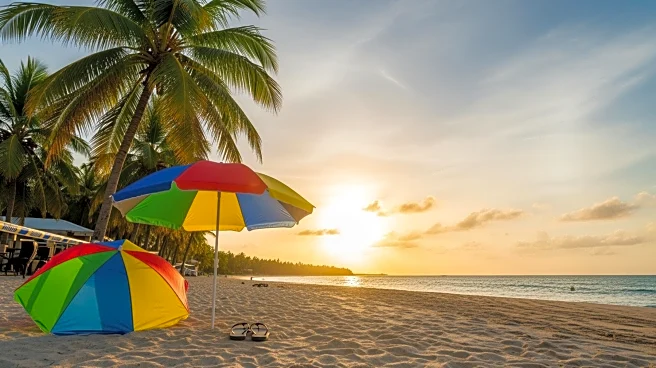What's Happening?
Jamaica is urgently working to recover from the devastation caused by Hurricane Melissa, a Category 5 storm that struck the island on October 28. The hurricane severely impacted the western region of Jamaica,
causing significant damage to infrastructure and the tourism sector, which is a crucial part of the nation's economy. With the peak tourism season just a month away, officials are racing to repair hotels and clear debris to attract the expected 4.3 million visitors. The Jamaica Hotel and Tourist Association, led by Christopher Jarrett, is assessing the damage, particularly in the northwest and southwest areas, although Negril was largely spared. International airports have reopened, but communication and electricity remain down in some areas, complicating recovery efforts.
Why It's Important?
Tourism is a vital component of Jamaica's economy, contributing approximately 30% to the GDP and employing around 175,000 people. The hurricane's impact threatens this economic lifeline, affecting not only hotels and resorts but also the broader supply chain, including construction, banking, and agriculture. The disruption has left many workers, like hotel housekeepers and craft vendors, without income, highlighting the storm's broader economic and social repercussions. The recovery of the tourism sector is crucial for the island's economic stability and the livelihoods of its residents.
What's Next?
Tourism Minister Edmund Bartlett has expressed optimism that the sector could return to normal by December 15, the start of the peak season. However, this timeline may vary, with larger hotel chains likely to recover faster than smaller establishments. The government and private sector are working to restore services and infrastructure, while aid workers and volunteers provide immediate relief. The ongoing recovery efforts will be critical in determining the speed and extent of economic recovery for Jamaica.
Beyond the Headlines
The hurricane has exposed vulnerabilities in Jamaica's infrastructure and emergency preparedness, prompting discussions on improving resilience against future natural disasters. The economic impact extends beyond tourism, affecting various sectors and highlighting the interconnectedness of Jamaica's economy. The situation underscores the need for comprehensive disaster management strategies to protect the island's economic interests and the well-being of its citizens.








